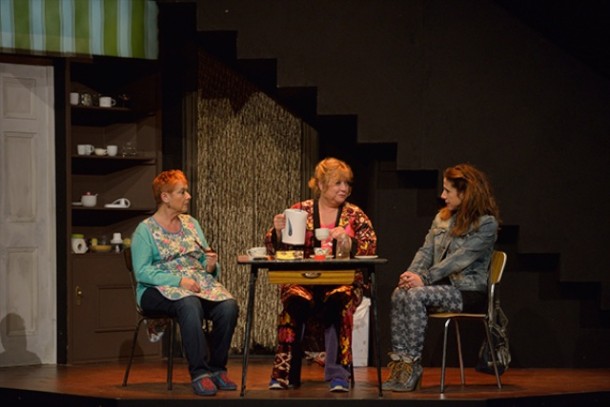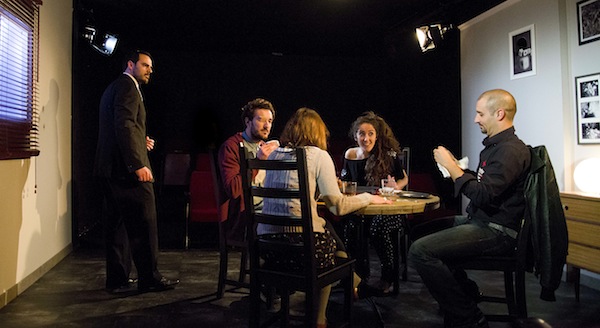There are many Daniel Veroneses. There is the Veronese offering intelligent, pared-down reimaginings of Chekhov—with Three Sisters, Uncle Vanya and A Seagull refashioned as Un hombre que se ahoga (A Man Drowning), Espía a una mujer que se mata (Spying on a Woman who is Killing Herself) and Los hijos se han dormido (The Children have Fallen Asleep); the Veronese presenting Albee’s Who’s Afraid of Virginia Woolf? as a vicious, angry tale of capitalism’s corruption of the domestic; and a more benign, wryly contemplative director, as evinced in his reading of Mark St. Germain’s Freud’s Last Session (2012). It is the latter that emerges in the Goya Theatre production of David Lindsay-Abaire’s Good People—rendered in Joan Sellent’s translation as Bona Gent.
Lindsay-Abaire’s 2011 play gravitates around the middle-aged Margie Walsh who has never managed to move on from the tough South Boston neighborhood where she grew up. Margie (Mercè Aránega) has had it tough. As a single mother with a dead-end job and an adult daughter with learning difficulties, she faces a dressing down from her fresh-faced boss when she arrives late for work for the umpteenth time because she cannot find anyone to sit with the vulnerable Joyce. Losing her job as a cashier, she faces eviction from her home until she hears from her best friend Jean (Nies Jaume) that her old flame Mike (Àlex Casanovas) is back in town with a flash job. Margaret has no shame and little fear so makes contact again in the hope that he can provide her with a job. She brazenly invites herself to his house party, and even when he calls to say the party has been cancelled, she turns up anyway fearing he is just saying that because he does not want her to be in contact with his new friends. Theirs is the central conflict in the play—acerbic Margie pitted against the smooth-talking, bourgeois Mike.
This is a play about escaping one’s past. Mike has made it out of the tough Southey neighborhood where he grew up, but, while Lindsay-Abaire seems to recognize that you can take the boy out of the neighborhood, he questions whether you can effectively take the neighborhood out of the boy. Mike is a well-kept, middle-aged man kept trim through a healthy diet and gym membership. The Southey accent has been ironed out along with the rough exterior. The hair is neatly combed back, the smile is regimentalized, and he knows (or thinks he knows) how to deal with awkward customers. But Margie is a match for him: large, buxom, and in-your-face. She has a penchant for loud colors—as her garish housecoat shows—velour tracksuits, and an acerbic tongue that bites. Years of hard knocks have taken their toll. Her features look worn and haggard, her posture appears on the hunched side. She resents the fact that Mike had the benefit of a supportive father who realized that he needed help in getting an education and rescued him from his own worst excesses. Margie never finished school and got ceremoniously dumped by the father of her child. She wants a break, but it is evident that Mike doesn’t harbor any kind of sentimental feelings for her. He just sees her as an embarrassment that he wants out of the way of his comfortable suburban home and prim African American wife.
![Bona gent [Good People], directed by Daniel Veronese at the Goya Theatre, Barcelona. Photo credits: David Ruano](http://europeanstages.org/files/2014/10/bona-gent-2-610x358.jpg)
Carol Muakuku as Kate, Mercè Aránega as Margie and Àlex Casanovas as Mike in Bona gent [Good People], directed by Daniel Veronese at the Goya Theatre, Barcelona. Photo: David Ruano
This is not a subtle production. Aránega is a comic actress with a large personality and plays her lines to a devoted fanbase. Characterization is on the broad side. The opening scene juxtaposes the buxom Margie with stick, insect-thin Stevie (Rubén Ametllé), an earnest do-gooder who faces the chop himself if he does not fire his unreliable cashier. Stevie wants to do his best: his tie is done up rather too tightly for comfort and his hair harshly slicked back, but he always looks stressed. Indeed, Veronese inflects the character’s poverty through a comic lens: Margie drinks coffee from the jar to etch out the last grains clinging to the bottom of the jar, and the regular appearances of Dottie’s seriously ugly bunnies always create a titter of laughter in the audience.
Paco Azorín’s revolving set juxtaposes Margie’s cramped kitchen with Mike’s minimalist office. While the idea of the spinning rooms has something of a wheel of fortune about it, there is an awkwardness to the scenes that take place in front of the red curtain—the play’s opening outside the supermarket where Margie works and the Southey friend’s bingo nights—which lend the production the air of a set that was finished on the cheap.
While this is not vintage Veronese, there is still much to admire in the production. The banter between Margie, Jean, and Dottie is nicely handled with perceptive touches highlighting the class schism between Margie and Mike: Mike swishes his wine glass to savor the wine, and Margie sips at hers awkwardly. She stands in his pristine living room like an elephant in the room.
Àlex Casanovas is the revelation of the evening. His fixed smile, easy manners, and efficient authority offer a credible characterization of a man who can’t quite banish the temper of Yore. The marital awkwardness with his younger trophy wife—who has her own anxieties about underachievement in not quite making the grade to teach at Harvard—throws further anxieties about race into the mix. Veronese’s portrait of their marriage presents it as a cold affair: a liaison where ‘managing’ their problems seems the primary priority.
Mike’s ill daughter and Margie’s disabled child hover over the action—unseen but continually present as a reminder of the matters that both bind and separate these old friends. In the end, Margie’s predicament is not solved—a temporary solution presents itself through Stevie’s kindness in donating his bingo winnings to her. But Margie’s position remains as precarious at the production’s end as it was at the opening.
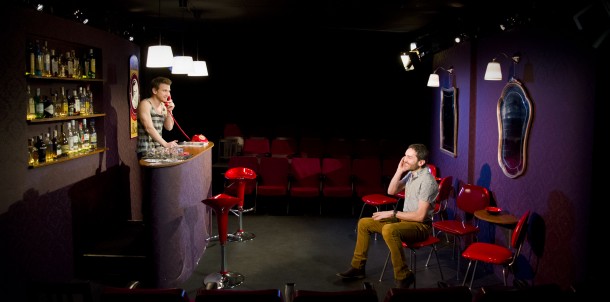
Àlex (Ramon Pujól) and Bruno (Albert Triola) as the couple who cannot quite get it together in Guillem Clua’s Smiley. Photo: Roser Blanch, courtesy of the Teatre Lliure
Guillem Clua has scored a small hit in Barcelona with Smiley, a simple tale of boy meeting boy in an age where social media refashion romantic relationships. Smiley pits Ramon Pujól’s good-looking, iron-pumping Àlex against the less-socially confident Bruno (Albert Triola), an architect who just cannot get excited about Barcelona’s gay gym culture. It is a relationship that emerges from a misunderstanding. Àlex co-owns hip Bar Bero—a funky social haunt for gay men. When his slick boyfriend refuses to return his calls, Àlex leaves a long confessional message on his mobile—but he has the number wrong, so it is Bruno who is the recipient of the message. Something clicks between them, and they agree to meet at Àlex’s bar, but it is not quite love at first sight. Bruno likes Àlex’s looks, but Àlex does not find Bruno quite so attractive. The rest of the play is a wry and hugely amusing tale of the path of true love never running smoothly. Àlex and Bruno have a night of passion, but the following morning status games come into play, and each lets the other go because it seems the easiest thing to do. Àlex finds a new boyfriend—a camp, Argentine actor called Pablo (also played by Triola), while Bruno pines for Àlex, joining a gym and hanging out in his neighborhood in the hope of catching up with him. Eventually he gets a text from Àlex inviting him to his birthday party, not realizing that it is Pablo who has sent a round robin to Àlex’s address book for the surprise party. Bruno and Àlex share a brief encounter before Pablo plans to whisk the latter off for a holiday to Buenos Aires—but, at the last minute, Àlex realizes that it is Bruno he wants, so Buenos Aires is jettisoned for Barcelona.
Clua directs his own play with amusing dexterity. We are all customers at Bar Bero—with front-row audience members handed bottles of beer by Àlex. The compact stage space is deftly organized so that Àlex’s bar is separated from Bruno’s home (dominated by a comfy sofa). Asides on the nuances of gay terms are shared with the audience with playful glee. Large mirrors at the back of the stage allow for the characters to preen and smarten themselves—a comment on Àlex and Bruno’s vanity, which is overt in the former’s case, covert in the latter’s. Clua’s production expertly captures the game-play in their relationship, sharing jokes and lingo about gay social networking with a knowing audience. Pujol and Triola are both terrific, excelling as the odd couple but also taking on a number of cameo roles as an assortment of butch, camp, and paranoid ex- and current boyfriends. The production moves along briskly, helped by Albert Pascual’s nifty set—where a notice presenting the bar’s name, skilfully positioned bar stools, and the aforementioned sofa serve to conjure Bruno and Àlex’s social worlds. This is a whisper-thin play, but its ability to capture the ups and down of a relationship forged through social media resonates with a contemporary audience. At the end, as Àlex and Bruno come together once more, the audience senses that they have played a key part in the proceedings. Indeed, watching the performance I felt that I was being asked to be a confidante and confessor, friend, and bar customer. Bringing Up Baby functions as a key reference for Bruno and Hawk’s 1938 film as both a thematic motif and the dramatic mechanism that finally brings the errant pairing together. The screwball comedy of the odd couple has been refracted through a gay prism with the Hepburn/Grant heterosexual couple given a contemporary airing through the Bruno-Àlex axis. Since opening at the Sala Flyhard in November 2012, the play has had outings at the Teatre Lliure’s studio space in Montjuïc and at the Club Capitol, which is where I saw it. And while the Capitol lacks the intimacy of the Flyhard or the Lliure, it was still able to ensure that we ‘buy’ into the adventures of this mismatched couple.
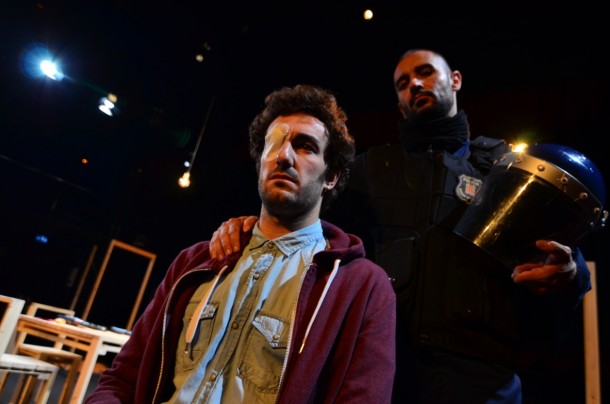
David (Alain Hernández) hovers over Ignacio (Miki Esparbé) in El rey tuerto (The One-Eyed King), written and directed by Marc Crehuet. Photo: Àngel Crehuet
The Flyhard has also served as the launching pad for Marc Crehuet’s El rei borni (The One-Eyed King, which I saw in the foyer space of Madrid’s Lara Theatre in its Spanish-language version, El rey tuerto). Cruhuet is perhaps best known for his work in television—most conspicuously as director of TV3’s Pop ràpid series—and the slick rhythms of his television work (as well as a drawing on the quick-witted core ensemble of Pop ràpid) certainly shape the pacing of the piece. The One-Eyed King appears to be based on a documented incident—the blinding of an Italian protestor by police in 2010—although the more recent eye injury suffered by Ester Quintana in November 2012 lends it a particular relevance in contemporary Spain. Crehuet shapes a scenario where the one-eyed protestor is brought face-to-face with the police officer responsible for the assault with unexpected consequences for all concerned.
Lidia (Betsy Túrnez) lives with her action-man boyfriend David (Alain Hernández) who thrives on the adrenalin of his job as a policeman, undertaking more and more duties involving crowd control in an unhappy Barcelona beset by marches, protests, and demonstrations. Lidia is into self-improvement and relishes a succession of new courses—cookery, belly dancing, photography—that help her acquire the skills that she associates with her sophisticated, old-school friend Sandra (Ruth Llopis). When she invites Sandra and her boyfriend to dinner, the evening turns into the night from hell as echoes of Abigail’s Party resonate through the single-set location. For Sandra’s boyfriend Ignacio (Miki Esparbé), an aspiring documentary filmmaker who boasts a political conscience, just happens to be the protestor blinded in one eye by David with a rubber bullet on a recent demonstration.
This is a dinner of shifting sympathies. The audience may initially root for the fragile Ignacio, but his glum smugness, cowardice, and empty rhetoric soon have our sympathies shifting. Alain Hernández’s David is compact, dangerous, and unable to control his behavior, but he is bereft of the malice that shapes Ignacio and Sandra. Increasingly, our attention shifts to the hapless and not terribly bright Lidia (a Betsy Túrnez who resembles the Verónica Forqué of Almodóvar’s Kika). Lidia does not have much to recommend her in the first instance—spouting racist comments with an ignorance that is breathtaking in its audacity. Gradually, however, her openness, her generosity of spirit, and willingness to approach the situation with a degree of thoughtfulness,lacking in Sandra and Ignacio, turn her into an unlikely heroine.
The piece owes much to Joe Orton in its frenetic, black humor. There is something of the physical energy of Dario Fo and the crazy antics of Monty Python in the frantic onstage energy of the performers (trapped in Lidia and David’s cramped apartment). Crehuet’s situation may be taken from ‘the real,’ but he shapes it through the deployment of a range of theatrical devices. The political jargon that spews from a television set comes in the form of a live performer (Xesc Cabot) who sets up the climate of empty posturing and false rhetoric that permeates the surrounding society. His voice at times echoes that of Spain’s Prime Minister, Mariano Rajoy, repeatedly preaching the multiple benefits of austerity, while dressed in a sharp, expensive suit.
Crehuet manipulates the action with a nuanced understanding of how farce works. Ignacio and David sit down at the dinner table without any kind of understanding of who the other is. As the situation unravels, we are left with something of Oedipus Rex meeting Dodge City as the two antagonists face up to each other in a stand-off fashion. Meanwhile, the politician continues spewing comments that seem progressively out of place, a big brother figure who cannot offer any constructive solution to the predicament the characters find themselves in. It is left to Lidia to try and find a way out both for herself and for David.
There is a marked attention to detail in the production. The volume button goes up on the television and Xesc Cabot’s politician speaks louder. The request that the audience switch off their mobile phones sounds out in the tone of a police statement just as the play is about to begin. Lidia’s plethora of courses make their presence felt in the references employed in her conversations, and her need to impress is evidenced in her extraordinary hairstyles, as well as a series of emphatic outfits where sequins have a prominent place. The lisping Ignacio may boast of his prowess on public demonstrations, but he is anxious about getting home, and his documentaries are evidently funded by daddy’s funds. David plays with firearms as if they were harmless toys and finds it increasingly hard to differentiate video games from reality as paranoia sets in. As David moves toward a different, touchy-feely approach, Ignacio finds it hard to practice what he preaches: anger, bitterness, and class-snobbery usurp any sense of political forgiveness.
The One-Eyed King is ultimately a play about social responsibility, the execution of state violence, and the need for political accountability. David’s desperate kidnapping of the Minister of Agriculture (Xesc Cabot) embodies the frustration of a generation who recognize the inefficacy of conventional forms of protest. Sandra and Ignacio offer no intellectual leadership, simply political posturing which is low on detail, courage, and commitment. The politician’s rehearsed responses signal the failure of Spain’s political system to offer any kind of nimble answer to the problems besetting the nation. Rhetoric is no longer a constructive solution for Spain’s woes. It may have a place in artistic discourse (as the performances deftly show), but the play exposes the flaws of a culture where it is never matched by constructive, ethical plans of action.
The play has proved a veritable hit, moving from Barcelona’s Sala Flyhard to a Madrid run, then returning in September 2013 to Barcelona’s Barts Theatre. It has expanded to fit into the different venues—now boasting a set by Pablo Sánchez and Manu Pagès that allows the audience to remain part of the ensuing action, while offering a tangible physical environment that provides a window into Lidia and David’s world. At a time when too much theatre is itself falling into the trap of offering simplistic agit-prop responses to the crisis, it is refreshing to see a play that offers sharp criticism filtered through a deft theatrical humor.
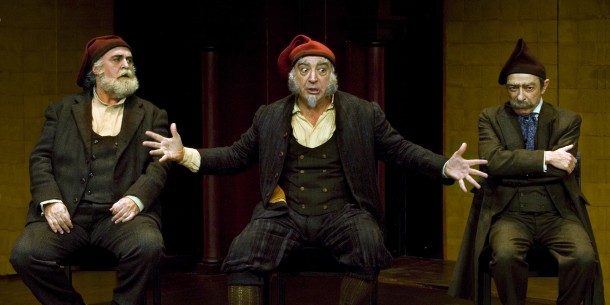
Arturo (Jordi Bosch), surrounded by two of his cronies Pepito (Andreu Benito) and Tomeu (Boris Ruiz) in Goldoni’s The Boors, directed by Lluís Pasqual at the Teatre Lliure. Photo: Ros Ribas, courtesy of the Teatre Lliure
Lluís Pasqual has returned to Goldoni many times during his long career. His choice of The Boors (Els feréstecsa (1760) is perhaps unusual because it is a play that is all too rarely staged outside the dramatist’s native Italy. Pasqual’s imaginative translation from the Venetian dialect captures the verbal game play between the characters—here rendered in an idiomatic Catalan, where the different inflections are captured through a variance of accents and dialects from Girona to Valencia, via Olot, Mallorca and Lérida. Tellingly, Pasqual situates the play in late, nineteenth-century Catalonia, at the time of Spain’s first Republic (1873-4)—a time when the lure of the new was meeting with opposition from antiquated customs and traditions. The Boors is a play about generational shifts and gender antagonisms and here family patriarch Arturo (Jordi Bosch) and his three crony friends—the boors of the play’s title—insist on holding on to the power they have enjoyed for centuries. Llucieta (Laura Aubert) wants to go and enjoy the carnival, but her boorish father Arturo (Jordi Bosch) has other ideas. He seeks to keep her indoors with her stepmother Margarita (Rosa Renom) until he can marry her off to his friend Salvador’s son, Quimet (Pol López). Llucieta is not happy with this predicament but with the assistance of her stepmother and the enterprising wives of the boorish men, they connive to ensure the match has a chance of working by bringing the couple together before the nuptials.
Pasqual opts for an aesthetic that eschews pure commedia in favor of a stylized, physicalized language that melds Cheek by Jowl’s fluid movement with the broad vaudeville of Hytner’s recent refashioning of Goldoni’s A Servant of Two Masters as One Man, Two Guvnors. Key here is the meticulous characterization of all the roles with no attempt to opt for an easy ‘one size fits all’ approach. Each of the four ‘boor’s is expertly delineated to offer a wisp of Pantaleone together with the more nuanced characterization of Molière—a writer Goldoni much admired. Jordi Bosch plays Arturo as a marionette, an animated robot who flaps his arms up and down like a mechanized bird. He is a man who believes in scolding, hard words and issues strict orders as if by clockwork. He boasts of his daughter’s virtues and deeds as a dog breeder might list the attributes of one of his puppies. His co-conspirator, Salvador (Xicu Masó), is a fierce ferret-like creature, sporting his red, Carlist beret—a mark of his right-wing credentials—with pride and boasting of his son’s prowess as if he were a fighting cock. The shy, nervy Quimet, however, seems very different from the character conjured by the boastful Salvador, and he bemoans the fact that his father has him working long hours in his shop. The aging and corpulent Pepito (Andreu Benito) openly boasts that he detests women. Tomeu (Boris Ruiz) is a wily figure who sports a large moustache and an ostentatious manner. Rai García and Pasqual’s expert lighting presents these four retrogrades as if they were a worn photograph—all dulled reds, blues, and beiges.
Their female antagonists are far more nubile. Laura Conejero’s coquetish Victòria outwits her pompous husband Tomeu with her charm, sophistication, and artful sense of play. Llucieta wants to wear more modern finery, but her father will have none of it. She knows better than to directly confront him, trying to score points on the sly and at the mercy of her stepmother who openly admits to wanting to be rid of her. Marina (Rosa Vila), Quimet’s aunt, works to make Llucieta fall for her nephew with the assistance of the cunning Victòria. Pol López’s Quimet enters Llucieta’s home disguised as a woman—supposedly Victòria’s sister from Milan, only when the boors realize they’ve been deceived they call off the wedding in anger at the ‘dishonor,’ until the inventive Victòria finds a way to bring the wrangling Arturo and Salvador together to agree to the marriage of their respective children. Ricardo (Carles Martínez), in a modern checked shirt, is the elegant outsider who looks with horror at the behavior of these opinionated men.
Pasqual’s production really does feel good enough to eat. There is a wiff of the fairground about it with a sweeping pace and carnivalesque air. Paco Azorín’s set (in contrast to that which he proffered for Bona Gent) uses the bare boards and architectural structure of the Lliure’s Fabià Puigserver Theatre to provide an open performance space where decor is primarily conjured through costume, props, and movement. Alejandro Andújar and Luis Espinosa’s costumes are beautifully thought through, from the woven espadrilles and floating skirts to the patchwork, layered, flamenco-like melange of Quimet’s disguise. The boors are all clad in a variation of the same color scheme, a uniform of sorts that positions their allegiances from the very opening, while Victòria’s elegant aqua outfit offers both a nod to the past and a modern cut that suggests this is a woman who functions ahead of her time. Laura Aubert’s hysterical vocals as the lanky Llucieta give a different image of femininity: a woman trapped within the home, whose automated movements and doll-like attire suggest she is a product of her father’s restrictive ideology.
The production’s 2013 run was extended through to June 16th and will return for the 2013/14 season from 7 May to 1 June. This was the only full house I saw during my time in Barcelona, suggesting that the production’s tale of enterprise in difficult times has not been lost on local audiences. At a time when the Lliure is battling with financial cuts—there has been a twenty-five percent loss in public funding since 2010 —its celebration of resourcefulness appears to have struck home. Until the City Council pledged an additional €500k in April, it looked likely that the Lliure would have to close for three months in the summer. With theatres struggling to cope with the increase in VAT from eight percent to twenty-one percent on all theatre tickets, the pressures of making work and attracting audiences in the current financial climate have seemed very much in evidence. The Boors celebrates the theatricality of theatre and offers a series of intelligent nods to the Lliure’s distinguished past history with Azorín’s set evoking those of many of Puigserver’s past stagings.
![Bittersweet moments of interplay and recollection in Oriol Broggi's 28 i mig [28 and a Half] at the Biblioteca de Catalunya. Photo: Bito Cels, courtesy of La Perla29](http://europeanstages.org/files/2014/10/28-and-a-half-4-610x407.jpg)
Bittersweet moments of interplay and recollection in Oriol Broggi’s 28 i mig [28 and a Half] at the Biblioteca de Catalunya. Photo: Bito Cels, courtesy of La Perla29
Broggi’s past productions function as the tapestry for 28 and a Half. The staging employs lines, images, costumes, and actors from his work over the past decade. Sonia’s final speech from Uncle Vanya, costumes from Antigone, lines from Incendis (Scorched), Hamlet and Espriu’s Primera història d’Ester (First Story of Esther) come together in 28 and a Half. It is as much a homage to his own company, LaPerla29, as it is a reflection on Fellini’s world.
Broggi avoids an overly intellectual tone, opting instead for physical, playful action. The audience is invited to be part of the game from the opening. Curtains open and close, part of a proscenium theatre protrudes, Dante’s Divine Comedy is recited by Xavier Boada—positioning the action from the very beginning within a particular Italian prism. Sound effects are created by the company—part of the process of rendering the making of theatre a visible part of the action. Clara Segura’s homely Antonieta is a warm, earthy creation, bonding with the bookish Pablo Derqui (the Guido-director figure as a young man) over the telling of a tale which they later enact. Pol López escapes through a magical window. New influences interact with prior stagings. Characters from Pirandello’s Six Characters in Search of an Author flood the stage, adding a further, metatheatrical dimension to the action.
Textual reflection gives way to physical action as the piece progresses—acrobats fall from a frame, characters dash in and out. A dazzling array of film stills testify to moments that play out intense desire (Burton and Taylor in Antony and Cleopatra), fast action (Cary Grant in North by Northwest), star-crossed lovers (West Side Story), death (The Seventh Seal), mistaken identity (Some Like it Hot), and regret (Casablanca). Shadows on the wall show the origins of cinema. The creation of a shipwreck at sea exposes the creation of a cinematic illusion.
This is a production about acting and actors—with the cast of nine moving from role to role with playful energy. One actor recalls seeing a piece of theatre that changed his life. Pablo Derqui’s Guido-Mastroianni figure may claim that he wants a film that is not about lies, but 28 and a Half recognizes that all theatre is ultimately a fiction and fiction is effectively a lie. Godard once commented that all you need for a movie is a girl and a gun. Fellini offered a gun, a girl, and a circus. Broggi proffers boys on bicycles, a man on a vespa, buxom housewives with brooms, a bride and groom—life flashing by as Derqui’s director reflects on death, recreating Mastroianni’s pose from the film against a projection of the actor.
The fast, furious, adrenaline-charged 28 and a Half offers an alluring, exhilarating journey through LaPerla29’s back catalogue, but ultimately, for all its visual flair and sonic energy, at two and a quarter hours, the production feels a little too long, a little too protracted, and a little too dependent on 8½, with too many endings crammed into the final fifteen minutes.
With the departure of Executive Director Joan Marco at Barcelona’s Gran Teatre del Liceu—the imposition of a political appointment in this position remains, as Marco so spectacularly indicated through his checkered tenure, problematic, anachronistic, and ultimately dangerous—and the arrival of music director Josep Pons, things appeared to be looking up. The announcement of Joan Matabosch’s appointment to the artistic directorship of the Teatro Real in September 2013 obviously creates a new series of challenges for the company. He replaces Gerard Mortier in Madrid having revitalized the programming at Barcelona’s opera house by programming local talent alongside key European and North-American directors. He has been savvy, ambitious, dynamic, and forward-thinking in his approach. The close of the 2012/13 season showed this programming policy at work to strong effect. Mario Gas’s sparkling production of L’elisir d’amore, set in small-town, post-WWII Italy, returned to the venue for another extended run. I first saw it in 2005 [see WES 17.3 Fall 2005, pp. 120-1] much admiring both its nods to neo-realism and its self-consciously nostalgic recreation of a lost world that may have only ever existed in the dream-factory of celluloid. Marcelo Grande’s symmetrical set juggles two levels linked by well-worn staircases, where locals wander around with baskets of produce and children scamper in the warm sun evoked by Quico Gutiérrez’s temperate lighting. Rolando Villazón’s impish Nemorino, swinging around lampposts as he bemoans Adina’s lack of interest in him, may not now have the vocal dexterity that I heard in 2005, but the local audience was evidently bewitched by his easy charm, soulful stare and furtive sighs. But the production’s expert choral work and the sense of a community conjured by Gas and his artistic team give the proceedings a feel-good flavor. Doors and windows open like those of pop-up books, Dulcamara (the larger than life Ambrogio Maestri) hands out his potions to the audience, and the community all celebrate the fervour with which Villazón’s Nemorino and Aleksandra Kurzak’s coquettish and beautifully sung Adina hold hands in the opera’s final act.
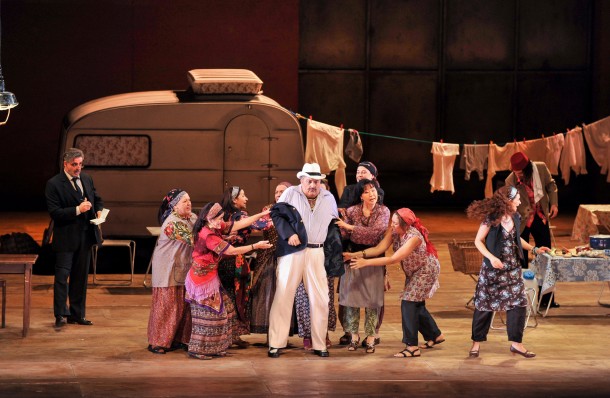
Characters congregate around the caravan in Christof Loy’s witty staging of Il Turco in Italia. Photo: Antonio Bofill, courtesy of the Gran Teatre del Liceu
If Gas’s production oozes easy entertainment, Christof Loy’s staging of Il Turco in Italia points to the Liceu’s continuing commitment to bringing the cutting edge of European mise en scène to Barcelona. Loy’s production is witty, smart, and knowing, overtly acknowledging how the tropes of orientalism are forged and lodged in the Western imagination. The 1950s Naples evoked by Herbert Murauer’s set has something of Fellini’s universe about it. And the character of the 81/2‘s tortured filmmaker is here refashioned as the poet Prosdocimo (Pietro Spagnoli) on the lookout for a plot that will cure his writer’s block. The production seems to be wilfully conjured by Prosdocimo’s imagination, a Pirandellian conceit that is reinforced both by chorus members appearing as members of the Liceu technical crew and nods to both Sellar’s Cosi fan tutte and Wilson’s Einstein on the Beach.
Gags follow in quick succession. The production begins with a caravan on stage from which one gypsy after another spill out—as if part of a magic trick. Zaida’s (Marisa Martin’s) home turf soon suggests a populous gypsy community at play: hanging out clothes to dry, playing cards, strumming instruments. If Zaida’s world is that of the dangerous other, Ilebrando D’Arcangelo’s Turkish suave and charming, as well as unusually youthful prince Selim suggests an exotic other fired by the Arabian Nights. He sweeps into town on a magic carpet flying through a twinkling, Neapolitan sky. The glamorous housewife Fiorilla (Nino Machaidze), on the other hand, represents a bourgeois domestication. She and her portly husband, Geronio (Renato Girolami), occupy a fashionable home filled with the comforts of middle-class wealth. Geronio boasts a blue-crested blazer and slim moustache and has something of a Corleone-like godfather about him. The heavily pregnant Fiorilla is a restless being, constantly preening herself and not beyond using her beauty to control her husband—as with spraying hairspray in his eyes when he dares suggest something she is unhappy about. Her bathroom cabinet and drinks cabinet are side by side—each housing the tools needed to get her ready to hit the town. She may be seven months pregnant (making a virtue out of the reality of Machaidze’s condition), but nothing is going to stop this girl having a good time. She boasts an impressive shoe collection—eat your heart out Imelda Marcos!—and an array of red and black outfits that signal danger. While David Alegret’s enthusiastic Narciso—all slick back hair and tight jeans—pines after her, she soon sets her sights on the suave Selim whose attempts to buy her do not quite prove as easy as he had hoped.
This is a high energy production, where disguise—as with act two’s costume shop distinguished by its racks of outfits—operates as a central trope. A rack of clothes offers a space for Fiorilla to tryst with Selim. Selim is shadowed by a silent bodyguard. The ball (where Geronio dresses as Selim and Zaida as Fiorilla) creates webs of confusion and amusement. Prosdocimo finds himself battered by the characters that he draws on to create his opera buffa. As the tale he has forged progresses, he finds himself assaulted by both Fiorella and Zaida. Geronio and Selim do battle for Fiorella in a boxing ring, where Prosdocimo finds himself accidently at the end of one of the men’s punches. Bound up with his own creations, he bumps into walls, trips, and falls. He ends the play as the walking wounded—with his head bandaged, his leg in plaster, and his arm seemingly broken. At the end he may be happy with his creation (as Zaida and Selim sail away and Fiorilla and Geronio are reconciled), but he has, as his bruised and battered body testifies, suffered for his art.
By emphasizing the Prosdocimo character trying to marshal the characters into a convincing story, as well as avoiding the more conventional interpretation of the Turk Selim as a lascivious old man, Loy establishes a sense of anarchic absurdism where all the characters are marooned, almost at times deliberately deconstructing the already complex and unconvincing plot. In doing so, he creates a compelling connection between the Pirandellian world of confusion and lack of meaning or identity with the Opera Buffa tradition which preceded it some two hundred years earlier.
Georgian soprano Nino Machaidze deploys her pregnancy to productive effect. She has something of the voluptuous Sophia Loren about her, while Renato Girolami’s puffing and panting Geronio suggests he would not be out of place in Pasqual’s staging of The Boors. While I have always found Il turco in Italia an overlong and at times un-dynamic opera, Loy deploys imagination, metatheatricality, and comedy to show its relevance to an age marked by migration, fear of the other, and a materialism that threatens to corrupt core human values.
![Cayetana Guillén Cuervo, Carmen Machi and Nathalie Pozo in Fuegos [Fires] directed by Josep Maria Pou at the Grec's Outdoor Theatre. Photo: Josep Aznar, courtesy of the Institut de Cultura de Barcelona](http://europeanstages.org/files/2014/10/Fire_FUEGOS_06-610x406.jpeg)
Cayetana Guillén Cuervo, Carmen Machi and Nathalie Pozo in Fuegos [Fires] directed by Josep Maria Pou at the Grec’s Outdoor Theatre. Photo: Josep Aznar, courtesy of the Institut de Cultura de Barcelona
Yourcenar’s creations float around the stage, and the movement of Torrent, Poza and Guillén Cuervo suggest ephemeral beings always slightly out of their author and audience’s reach. Pou never erases the literary qualities of the piece. Indeed, the effect is that of a musical recital, with technical virtuosity replaced by fierce indignance, raw pain, and the terrible void left by abandonment. The trio of Mary Magdalene, Sappho, and Clytemnestra rant, rave, whisper, howl, and plot. Torrent’s Sappho is the frailest and most vulnerable, Guillén Cuervo’s Mary Magdalene the most seductive (and pragmatic), Nathalie Poza’s Clytemnestra the fiercest and most canny of the three. The sense is frequently that of watching a series of human emotions at play. Machi’s Yourcenar embodies the terrible passion of an obsession that is unrequited—Yourcenar was never able to consummate her relationship with her homosexual editor, André Fraigneau, with whom she travelled regularly in the early 1930s. Pou ensures that the production is both a treatment of Yourcenar’s amorous frustrations and a wider reflection on the ways in which the theatrical canon is made up of stories where women remain to tell stories of abandonment, ill-treatment, and survival.
The Grec’s international programme brought work from Japan (Oriza Hirata’s Android Three Sisters), the Netherlands (Tonneelgroep’s Roman Tragedies), France (Emmanuel Demarcy-Mota’s staging of Ionesco’s Rhinoceros), Germany (Jen’s Dietrich’s International Institute of Political Murder Hate Radio), and Argentina (Claudio Tolcachir’s El viento en un violin [The Wind in a Violin]. Tolcachir has been a regular visitor to Spain over the past seven years. His first original play with his theatre Timbre 4, La omisión de la familia Coleman (The Coleman Family’s Omission), was initially seen in Spain in 2007—he has subsequently returned on numerous occasions, both bringing his own work from Buenos Aires and creating Bespoke Productions for Spanish production houses, as with a 2011 staging of All My Sons [reviewed in WES, 23.3 (Fall 2011), pp. 45-6. The Wind in a Violin was first seen at Girona’s Temporada Alta in 2010 but now returns to the Teatre Romea, where Timbre 4 regular Lautaro Perotti is replaced by Tolcachir in the role of grungy son Dario.
![Celeste in bed in Claudio Tolcachir's El viento en un violin [The Wind in a Violin], seen at the Grec Festival. Photo: Magali Him, courtesy of the Institut de Cultura de Barcelona](http://europeanstages.org/files/2014/10/El-viento_The-wind-7-610x406.jpeg)
Celeste in bed in Claudio Tolcachir’s El viento en un violin [The Wind in a Violin], seen at the Grec Festival. Photo: Magali Him, courtesy of the Institut de Cultura de Barcelona
Dora (Araceli Dvoskin), Mecha’s put-upon cleaner and cook, lives in a less affluent part of town with her lesbian daughter Celeste (Paula Ransenberg) and the latter’s volatile girlfriend Lena (Inda Lavalle). Celeste and Lena are desperate to be parents and hit about a scheme to find an unsuspecting male that Celeste can seduce to get pregnant. They hit on Dario who is unable to work out what is going on until it is too late. Dario achieves some sense of escape in the unconventional arrangements he comes to with Lena and Celeste, joining their family set-up at Dora’s cramped apartment.
Unsurprisingly, the piece has much in common with The Coleman Family’s Obsession: taut, claustrophobic interiors, characters facing testing circumstances (both domestic and emotional), sharp, sassy dialogue, bubbling resentment that emerges when least expected. Gonzalo Córdoba Estévez’s design fuses the two domestic interiors into a single set where the homes exist side by side. In each, the bed dominates. From the beginning, Tolcachir relies on his audience’s complicity. Actors stare at audience before getting into position, knowingly recognizing their role-play. Lena and Celeste begin the play in one bed, cramped but together. On the other side of the set, the sleeping Mecha is alone and disengaged when she is woken by the industrious Dora. She is late for work, insensitive, and incapable of getting the inactive Dario up. Dora may be slow and take her time, but she is the one person at work as the play begins. Her status as the play’s doer is established from the very opening, while the other characters fluster and fuss.
Dario resents Santiago—they are of the same age but Santiago is employed, while Dario is entirely dependent on his castrating mother. The latter gives up her apartment so that Dario can entertain Celeste, but, while Mecha boasts generosity and open-ended love, her insistence on finding out what Dario is saying to his therapist implicates both her and Santiago in a web of unethical betrayals. As she sees Dario breaking away from her, she opts for desperate cruelty, informing Dario that he killed his twin brother—also called Dario—at birth, by strangling him with the umbilical cord. She blames him for his elder brother’s death and knowingly bestows on him a guilt that she knows he will not find easy to shake off. “Thus he came into the world, assassinating,” she states bitterly. Love is very conditional and very fickle for Mecha. I loved you she tells her son—a brutal, harsh, past-tense that further accentuates Dario’s move away from home.
![Claudio Tolcachir's El viento en un violin [The Wind in a Violin], seen at the Grec Festival. Photo: Magali Him, courtesy of the Institut de Cultura de Barcelona](http://europeanstages.org/files/2014/10/el-viento2-610x406.jpg)
Claudio Tolcachir’s El viento en un violin [The Wind in a Violin], seen at the Grec Festival. Photo: Magali Him, courtesy of the Institut de Cultura de Barcelona
The piece could be called “Bringing Up Baby,” and that is indeed what Dario, Lena, and Celeste are doing as the play closes. Perhaps the final moments show that our antiquated understandings of family and home need to be refashioned to respond to the demands of our age so that they can properly support the evolving structures of the labor market, as well as a society where youth unemployment prevails. In the play’s final scene, Dario is left holding the baby—perhaps discovering a purpose in life that was missing in his domestic arrangements with his mother. This is a play where fathers are resolutely absent and their absence largely unexplained. Perhaps Dario, Lena, and Celeste have grown up in a world without appropriate male role models. The challenge lies in envisaging a new order where exploitation and cruelty are far less prevalent and compassion more in evidence.
The cast, all Tolcachir regulars, are uniformly excellent. Miriam Odorico’s Mecha has something of the restless energy of Frances McDormand and the seductive tones of Frances de la Tour. Inda Lavalle’s manic Lena and Paula Ransenberg’s dreamy Celeste offer a veritable portrait of an obsession that knows no bounds, while Gonzalo Ruiz’s Santiago—sitting on the fence until it collapses around him—shows the dangers of not respecting client-doctor confidentiality. Tolcachir, replacing Lautaro Perotti as Dario, offers a persuasive depiction of the ambling student. Perroti’s darting eyes and wiry demeanor have been replaced by a Tolcachir’s more ambling characterization. There is something of the clumsy bull in a china shop in his Dario, and it renders him an altogether sadder figure: a stunted child trapped in the body of a man.
I close with a shift to Madrid, reviewing a production that makes a reappearance in the Teatro de la Abadía’s autumn 2013/14 season but which was first seen at the Abadía a year earlier before playing at Barcelona’s Romea theatre in January-February 2013. Manuel Calzada Pérez’s El Diccionario (The Dictionary), a co-production between La Abadía and Anadramápete, offers a fascinating evaluation of one of Spanish culture’s “forgotten” women. María Moliner was a Republican and librarian who survived the Franco regime through astute but quiet endeavors. Her ambitious plans for Libraries for the Valencian Government during the Civil War were jettisoned after Franco’s victory, and her own demotion to a position at Madrid’s Engineering Library seemed to signal the end of her career. Laboring quietly in the shadows, however, without drawing attention to herself, she was able to author a dictionary that questioned that of Spain’s major, language-regulating body, the Real Academia Española. Her now legendary Diccionario de uso del español (Dictionary of the Use of Spanish) remains a major reference work in the Spanish-speaking world—Gabriel García Márquez is one of its most fervent fans.
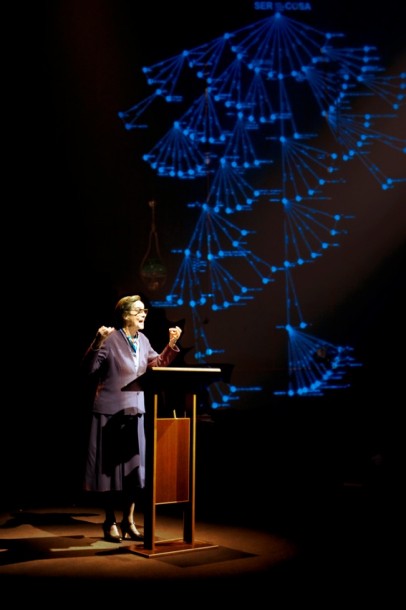
Vicky Peña as María Moliner in Manuel Calzada Pérez’s El diccionario (The Dictionary). Photo: Ros Ribas, courtesy of Teatro de la Abadía Madrid
A visit by the now retired Moliner (Vicky Peña) to a neurologist (Helio Pedregal) sets up the play’s central premise. The neurologist thinks Moliner is mad when she tells him that she is authoring a dictionary, but he soon comes to realize that it is not senility but the onset of cerebral arteriosclerosis that is causing her loss of memory. Her visits to him provide a narrative mechanism for recounting episodes from her past—some of which are staged on the opposite, left-hand side of the stage. This is the space accorded to Moliner and her husband Fernando (Lander Iglesias), a Nuclear Physicist who has lost his University Chair as a result of his political affiliations. Their discussions reveal political aspirations that were never realized, an enterprising spirit, and the struggle of surviving under the Franco’s regressive regime. They stand in marked contrast to the progressive descent into the oblivion that results from her illness.
The flashback mechanism serves to contrast Moliner’s creative past with her disintegrating present. It becomes a little labored and predictable but serves the story well. Vicky Peña is superb as the obsessive perfectionist who will not hand in the dictionary to her publishers until it is as complete as humanly possible. Moliner’s clipped vocals, tidy posture, and inconspicuous persona are beautifully captured in Peña’s nuanced performance. Alternating between scenes with her husband and her neurologist, Peña’s Moliner appears as a figure of obsessive determination and dry wit. When her neurologist says it is not normal for a woman of her age to have a degree in Philosophy, she fires back a reply: “It’s very normal, just not very frequent.” Her determination is evident in her relationship with her husband— Lander Iglesias plays him as a man shadowing her in more ways than one—whose attempts to get her to let the dictionary go meet on deaf ears. Francisco Leal’s sepia set allows fluid movement between temporal periods with words projected on the back wall and piles of books atmospherically conjuring a world shaped by the shape of words. José Carlo’ss Plaza’s production is clean, clear, and uncluttered and allows for a sense of proximity with the audience—which works both for the public scenes showing Moliner presenting her dictionary and giving her address to the Royal Spanish Academy, which shamefully never granted her membership—and the more intimate encounters between Moliner and her husband. And while the play is not as lithe as bio-dramas like Wit or Masterclass, it offers a much overdue assessment of a woman that history might have forgotten.
is Professor of Theatre & Screen Arts at Queen Mary University of London and co-editor of Contemporary Theatre Review. Her books include “Other” Spanish Theatres: Erasure and Inscription on the Twentieth Century Spanish Stage (MUP, 2003) and Federico García Lorca (Routledge, 2008), the co-edited Contemporary European Theatre Directors (Routledge, 2010), three further co-edited volumes for Manchester University Press, and two collections of translations for Methuen. Her co-edited volume, A History of Theatre in Spain, was published by Cambridge University Press in 2012.
European Stages, vol. 3, no. 1 (Fall 2014)
Editorial Board:
Marvin Carlson, Senior Editor, Founder
Krystyna Illakowicz, Co-Editor
Editorial Staff:
Elizabeth Hickman, Managing Editor
Bhargav Rani, Editorial Assistant
Advisory Board:
Joshua Abrams
Christopher Balme
Maria Delgado
Allen Kuharsky
Jennifer Parker-Starbuck
Magda Romańska
Laurence Senelick
Daniele Vianello
Phyllis Zatlin
Table of Contents:
• The 68th Avignon Festival 2014, July 4 to 27: Protests and Performances by Philippa Wehle
• The Avignon Fringe Festival 2014 by Manuel García Martinez
• The Reality Bites of New Bulgarian Theatre by Dessy Gavroliva
• Happy Days: Enniskillen International Beckett Festival 2014, July 31-August 11 by Beate Hein Bennett
• Flemish Theatrical Exceptionalism Mostly Glimmers, Sometimes Wavers by David Willinger
• Shouting at the Devil (and Everyone Else): Yaël Farber’s Production of The Crucible at The Old Vic by Erik Abbott
• Mladinsko Theatre and Oliver Frljić’s Damned Be the Traitor of His Homeland! (Sibiu International Theatre Festival, Romania, 2014) by Ilinca Todoruţ
• Barcelona Theatre (2013): Responding to Spain’s Crisis by Maria Delgado
• Report from Madrid by Duncan Wheeler
• Irish Colonial History on the Hungarian Stage by Mária Kurdi
• Fantastic Realities: Actors as Puppets and Puppets as Actors by Roy Kift
Martin E. Segal Theatre Center:
Frank Hentschker, Executive Director
Marvin Carlson, Director of Publications
Rebecca Sheahan, Managing Director
©2014 by Martin E. Segal Theatre Center
The Graduate Center CUNY Graduate Center
365 Fifth Avenue
New York NY 10016
